The Impact of AI in Human Careers Opportunities: Will AI destroy Human’s career in 21st century?
- The Impact of AI in Human Careers Opportunities: What is the impact of AI on humans?
- The Impact of AI in Human Careers Opportunities brief intro no. 1: Shifting Roles and Skills
- The Impact of AI in Human Careers Opportunities brief intro no. 2: Job Creation and New Roles
- The Impact of AI in Human Careers Opportunities brief intro no. 3: Enhancing Human Capabilities
- The impact of AI in Human Careers opportunities topic no.1: Automation and Job Transformation
- The impact of AI in Human Careers oppotunities topic no.2: Opportunities and Challenges for Workers
- Opportunities for Workers:
- Challenges for Workers:
- The impact of AI in Human Careers oppotunities topic no.3: The Role of Human Judgment and Skills in an AI World
- The Need for Educational Prioritization
- The impact of AI in Human Careers oppotunities topic no.4: Upskilling in AI and Machine Learning
- Upskilling in the Era of AI
- Upskilling vs. Reskilling
- AI-Powered Learning Platforms
- The impact of AI in Human Careers oppotunities topic no.5: Sector-Specific Impacts of AI on Human Careers
- Sector-Specific Impacts of AI on Human Careers no.1: Manufacturing and Automation:
- Sector-Specific Impacts of AI on Human Careers no.2: Healthcare and Medical Fields:
- Sector-Specific Impacts of AI on Human Careers no.3: Financial Services and Fintech:
- Sector-Specific Impacts of AI on Human Careers no.4: Retail and Customer Service:
- Sector-Specific Impacts of AI on Human Careers no.5: Transportation and Logistics:
- Sector-Specific Impacts of AI on Human Careers no.6: Education and EdTech:
- Sector-Specific Impacts of AI on Human Careers no.7: Energy and Sustainability:
- Sector-Specific Impacts of AI on Human Careers no.8: Legal and Compliance:
- Sector-Specific Impacts of AI on Human Careers no.9: Entertainment and Creative Industries:
- Sector-Specific Impacts of AI on Human Careers no.10: Agriculture and AgTech:
- The impact of AI in Human Careers oppotunities topic no.6: Predictions for the Future and the Role of Humans in an Automated World
- Accelerating Progress in AI and Automation
- How AI and Automation Impact Work
- Key Workforce Transitions and Challenges
- The Role of Humans in an Automated World
- Conclusion:The Impact of AI in Human Careers Opportunities
- FAQs: (The impact of AI in human careers opportunities)
The Impact of AI in Human Careers Opportunities: What is the impact of AI on humans?
Artificial Intelligence (AI) is no longer confined to science fiction—it’s reshaping the landscape of work, talent, and roles across industries. As organizations embrace AI-driven solutions, HR leaders find themselves at the forefront of this transformation. In this blog, we’ll explore how AI is revolutionizing human careers, the challenges it poses, and the opportunities it presents.
So in this blog, we will find out the impact of AI on employment or the impact of AI on jobs. So lets start our topic the impact of AI in human careers opportunities.
The Impact of AI in Human Careers Opportunities brief intro no. 1: Shifting Roles and Skills
Gartner predicts that implementing AI within existing professions and industries will lead to a gradual shift in roles. As AI automates routine tasks, fewer people will be needed for repetitive work. However, this doesn’t mean job losses. Instead, it opens up new opportunities for upskilling and reskilling. HR professionals must understand these evolving roles and equip employees with the necessary skills to thrive in an AI-augmented workplace.
The Impact of AI in Human Careers Opportunities brief intro no. 2: Job Creation and New Roles
Contrary to fears of widespread job displacement, AI is also creating new roles. Organizations worldwide anticipate job growth due to AI adoption. According to the World Economic Forum, 50% of surveyed organizations expect AI to drive job creation over the next five years. These new roles span data science, AI ethics, and AI implementation, among others. As AI evolves, so do the career paths available to individuals.
The Impact of AI in Human Careers Opportunities brief intro no. 3: Enhancing Human Capabilities
AI isn’t here to replace humans—it’s here to enhance our capabilities. By automating repetitive tasks, AI frees up employees’ time for more meaningful work. It processes vast amounts of data, providing insights that inform decision-making. As a result, employees can focus on creativity, problem-solving, and strategic thinking. The future of work lies in collaboration between humans and AI.
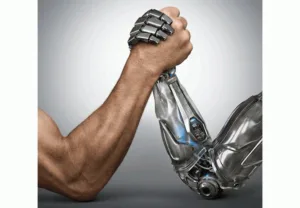
The Impact of AI in Human Careers Opportunities. Pic credit: Pinterest
In this blog series, we’ll delve deeper into AI’s impact on specific industries, explore success stories, and discuss strategies for HR leaders to navigate this transformative era. Stay tuned for more insights on how AI is shaping the workforce of tomorrow!
The impact of AI in Human Careers opportunities topic no.1: Automation and Job Transformation
Automation, driven by technological advancements, is reshaping the workforce landscape. As organizations adopt new technologies, job roles and responsibilities evolve, leading to a profound transformation. Here are key insights into this dynamic process:
- Skill Shifts and Adaptation:
- Automation acts as a catalyst for job transformation. It shifts the focus from routine, manual tasks to more complex, cognitive functions.
- Workers need to adapt by developing new skills or deepening existing ones. The demand for certain skills will rise, while others will decline.
- Technological Skills: The need for advanced technological skills, including IT and programming, will grow significantly. Innovators, developers, and adaptors of advanced technologies will be in demand.
- Basic Digital Skills: As automation becomes pervasive, basic digital skills are essential for everyone. These skills are the second-fastest-growing category, emphasizing the importance of digital literacy.
- Social and Emotional Skills: The demand for finely tuned social and emotional skills will rapidly increase. These skills are crucial for effective collaboration and communication in a technology-driven environment.
- New Roles and Improved Job Quality:
- Automation doesn’t merely eliminate jobs; it transforms them. New roles emerge, requiring different skill sets.
- Creativity and Problem-Solving: As routine tasks get automated, workers can focus on creative problem-solving and innovation.
- Job Enrichment: Automation allows employees to engage in more meaningful work, enhancing job satisfaction and overall quality of life.
- Enhanced Productivity and GDP Growth:
- Automation leads to higher productivity, benefiting both organizations and economies.
- Human-Machine Interaction: As people increasingly interact with smarter machines, productivity gains become evident.
- Economic Impact: Automation contributes to GDP growth, driving prosperity and economic development.
- Challenges and Adaptability:
- While automation brings benefits, challenges exist:
- Displacement: Some jobs may disappear due to automation, necessitating reskilling or upskilling.
- Inequality: The skill gap could widen, leading to income inequality.
- Ethical Considerations: Organizations must balance automation with ethical practices and social responsibility.
- While automation brings benefits, challenges exist:
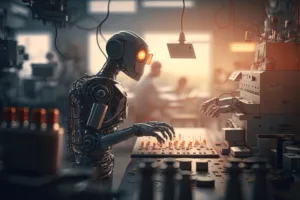
The Impact of AI in Human Careers Opportunities. Pic credit: Pinterest
The impact of AI in Human Careers oppotunities topic no.2: Opportunities and Challenges for Workers
Opportunities for Workers:
- Gig Economy and Platform Work:
- The gig economy offers flexible work arrangements, allowing workers to choose when and where they work.
- Platform-based work (such as ride-sharing, food delivery, and freelance platforms) provides income opportunities for millions of people.
- Gig work can be a stepping stone for entrepreneurship or a supplementary income source.
- Skill Development and Upskilling:
- Workers can enhance their skills through online courses, workshops, and certifications.
- Upskilling opens doors to better-paying jobs and career growth.
- Remote Work and Work-Life Balance:
- Advances in technology enable remote work, reducing commuting time and improving work-life balance.
- Workers can choose jobs that align with their personal lives and preferences.
- Diverse Job Roles and Specialization:
- The digital age offers diverse job roles, from data analysts to content creators.
- Specialized skills are in demand, allowing workers to carve out unique career paths.
- Entrepreneurship and Side Hustles:
- Gig work allows individuals to experiment with entrepreneurship.
- Side hustles can supplement income and provide financial security.
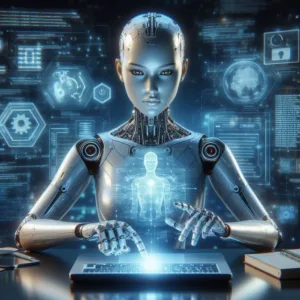
The Impact of AI in Human Careers Opportunities. Pic credit: Pinterest
Challenges for Workers:
- Job Insecurity:
- Gig workers lack job stability and benefits like health insurance and retirement plans.
- Uncertainty about future income can cause stress.
- Skill Mismatch and Automation:
- Rapid technological changes may render certain skills obsolete.
- Workers must adapt to stay relevant and avoid displacement due to automation.
- Income Disparities and Exploitation:
- Gig workers often earn less than traditional employees.
- Some platforms exploit workers by setting low wages or imposing unfair terms.
- Lack of Social Safety Nets:
- Gig workers don’t have access to traditional employee benefits.
- Policies need to address this gap to ensure worker well-being.
- Isolation and Loneliness:
- Remote work can lead to social isolation.
- Lack of workplace interactions affects mental health.
The impact of AI in Human Careers oppotunities topic no.3: The Role of Human Judgment and Skills in an AI World
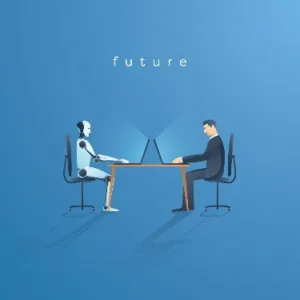
The Impact of AI in Human Careers Opportunities. Pic credit: Pinterest
As automation continues to reshape the world of work, recognizing the inherent value of human skills becomes paramount. While machines excel at processing data and making predictions, certain aspects of work remain distinctly human. Here are some key points:
- Emotion and Context:
- Emotion and context are two indispensable components that differentiate humans from machines.
- These aspects underpin critical skills such as effective communication, problem-solving, and judgment.
- While AI can provide data, predictions, and recommendations, the ultimate call—a blend of intuition, experience, and understanding—is uniquely human.
- Challenges of Automation:
- Automation transforms various job sectors, affecting mindset, organizational setup, work allocation, workforce composition, and C-suite functions.
- Repetitive and routine tasks are vulnerable to automation, but it’s equally important to consider which facets of existing jobs may be replaced by machines.
- For instance, while machines may surpass human capabilities in diagnosing illnesses, the empathetic and communicative aspects of a physician’s role remain challenging to automate.
- Critical Thinking and Problem-Solving:
- Human judgment involves critical thinking, weighing pros and cons, and making informed decisions.
- AI can inform and guide, but rarely replace human critical thinking.
- Whether it’s a CEO deciding the future direction of a company or a team lead managing interpersonal conflicts, human judgment plays a pivotal role.
- Effective Communication:
- Machines can process information, but effective communication requires empathy, nuance, and understanding.
- Human communication involves context, tone, body language, and cultural sensitivity.
- These skills are essential for collaboration, negotiation, and building relationships.
- Ethical Considerations and Judgment:
- Ethical decision-making involves weighing consequences, considering societal impact, and adhering to moral principles.
- Human judgment navigates complex ethical dilemmas, ensuring responsible use of technology.
- AI lacks consciousness and cannot make value-based judgments.
The Need for Educational Prioritization
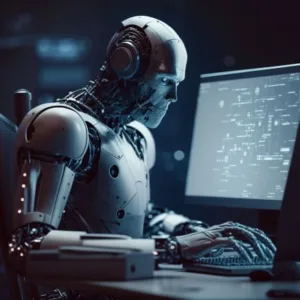
The Impact of AI in Human Careers Opportunities. Pic credit: Pinterest
Educational systems must prioritize the development of these human skills:
- Emotional Intelligence: Teaching empathy, active listening, and understanding emotions.
- Contextual Awareness: Fostering an understanding of diverse contexts and cultural nuances.
- Ethical Reasoning: Encouraging critical thinking about ethical dilemmas.
- Adaptability: Preparing individuals to navigate changing work environments.
The impact of AI in Human Careers oppotunities topic no.4: Upskilling in AI and Machine Learning
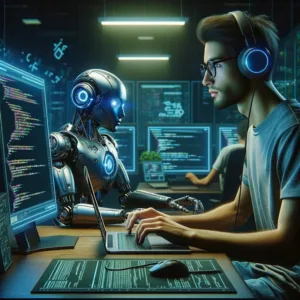
The Impact of AI in Human Careers Opportunities. Pic credit: Pinterest
Upskilling in the Era of AI
As artificial intelligence (AI) continues to revolutionize industries, organizations recognize the need to equip their workforce with relevant skills. Upskilling involves enhancing employee skill sets through training and development programs, ensuring they stay abreast of technological changes and market demands1. Here’s why upskilling matters:
- AI Disruption and Job Roles:
- Executives understand that generative AI will transform how organizations design customer and employee experiences.
- Employees must adapt to meet these changing needs, leading to a surge in interest in AI upskilling.
- Gallup polls reveal that a quarter of workers worry about job obsolescence due to AI, emphasizing the urgency for skill development.
- The Role of CHROs:
- Chief Human Resources Officers (CHROs) play a crucial role in decision-making regarding skill automation.
- They determine which skills remain mission-critical and which ones technology can automate.
- CHROs should lead efforts to enhance AI capabilities across the workforce, ensuring employees can leverage AI effectively.
- AI-Driven Productivity and Problem Solving:
- AI promises increased productivity and value.
- Employees seek advanced technical skills to harness AI’s power, making their jobs more efficient.
- Organizations benefit from upskilling by improving problem-solving and overall productivity.
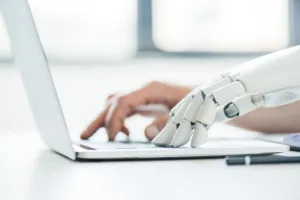
The Impact of AI in Human Careers Opportunities. Pic credit: Pinterest
Upskilling vs. Reskilling
- Upskilling:
- Definition: Upskilling involves improving existing skills to prepare employees for changes in job roles or functions.
- Objective: Minimize skill gaps and empower employees to adapt to evolving requirements.
- Example: Customer care representatives learn to use generative AI and chatbots to enhance real-time customer interactions.
- Reskilling:
- Definition: Reskilling refers to learning entirely new skills to transition into different roles or domains.
- Purpose: Address skill gaps resulting from technological shifts or organizational changes.
- Example: A traditional accountant learns data science and becomes a financial analyst using AI-driven insights.
AI-Powered Learning Platforms
- Continuous Learning Journey:
- AI-driven platforms track participation, comprehension, and skill gains.
- Interactive questions, workshops, and simulations provide ongoing feedback.
- Learners engage in real-world applications, adapting to AI-driven changes.
- Personalized Learning Paths:
- AI tailors content to individual needs, ensuring relevant skill development.
- Adaptive algorithms adjust difficulty levels based on learner progress.
- Personalization enhances engagement and effectiveness.
The impact of AI in Human Careers oppotunities topic no.5: Sector-Specific Impacts of AI on Human Careers
Sector-Specific Impacts of AI on Human Careers no.1: Manufacturing and Automation:
- Impact: Manufacturing has witnessed significant automation due to AI-driven robotics and process optimization.
- Job Transformation: Routine assembly line tasks have been automated, leading to job displacement for low-skilled workers.
- Upskilling Opportunities: Workers need to acquire skills in robotics maintenance, programming, and process optimization.
Sector-Specific Impacts of AI on Human Careers no.2: Healthcare and Medical Fields:
- Impact: AI aids in diagnostics, drug discovery, and personalized medicine.
- Job Transformation: Radiologists, for example, collaborate with AI algorithms for more accurate diagnoses.
- Upskilling Opportunities: Healthcare professionals must understand AI applications and interpret AI-generated insights.
Sector-Specific Impacts of AI on Human Careers no.3: Financial Services and Fintech:
- Impact: AI streamlines financial processes, fraud detection, and risk assessment.
- Job Transformation: Routine tasks like data entry and basic customer service are automated.
- Upskilling Opportunities: Financial analysts and advisors need expertise in AI-driven analytics and algorithmic trading.
Sector-Specific Impacts of AI on Human Careers no.4: Retail and Customer Service:
- Impact: AI powers chatbots, recommendation engines, and inventory management.
- Job Transformation: Traditional cashier roles decline, while demand for data analysts and customer experience specialists grows.
- Upskilling Opportunities: Retail workers should learn data analytics and customer behavior analysis.
Sector-Specific Impacts of AI on Human Careers no.5: Transportation and Logistics:
- Impact: AI optimizes route planning, fleet management, and delivery logistics.
- Job Transformation: Truck drivers face potential displacement due to autonomous vehicles.
- Upskilling Opportunities: Logistics professionals can specialize in AI-driven supply chain management.
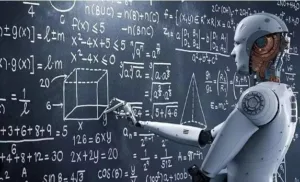
The Impact of AI in Human Careers Opportunities. Pic credit: Pinterest
Sector-Specific Impacts of AI on Human Careers no.6: Education and EdTech:
- Impact: AI enhances personalized learning, adaptive assessments, and student engagement.
- Job Transformation: Teachers collaborate with AI tools for customized lesson plans.
- Upskilling Opportunities: Educators need to understand AI applications in education.
Sector-Specific Impacts of AI on Human Careers no.7: Energy and Sustainability:
- Impact: AI improves energy efficiency, grid management, and predictive maintenance.
- Job Transformation: Energy analysts and technicians work alongside AI systems.
- Upskilling Opportunities: Energy professionals should learn AI-driven analytics and predictive modeling.
Sector-Specific Impacts of AI on Human Careers no.8: Legal and Compliance:
- Impact: AI assists in legal research, contract analysis, and compliance monitoring.
- Job Transformation: Paralegals and legal researchers collaborate with AI tools.
- Upskilling Opportunities: Legal professionals need to adapt to AI-assisted workflows.
Sector-Specific Impacts of AI on Human Careers no.9: Entertainment and Creative Industries:
- Impact: AI influences content creation, recommendation algorithms, and virtual reality experiences.
- Job Transformation: Content creators collaborate with AI-generated ideas.
- Upskilling Opportunities: Creatives should explore AI-driven storytelling and interactive media.
Sector-Specific Impacts of AI on Human Careers no.10: Agriculture and AgTech:
- Impact: AI optimizes crop management, pest control, and yield prediction.
- Job Transformation: Agricultural workers integrate AI-powered sensors and drones.
- Upskilling Opportunities: Farming professionals need knowledge of precision agriculture and AI tools.
The impact of AI in Human Careers oppotunities topic no.6: Predictions for the Future and the Role of Humans in an Automated World

The Impact of AI in Human Careers Opportunities. Pic credit: Pinterest
Accelerating Progress in AI and Automation
- Rapid Technological Progress:
- Beyond traditional industrial automation, new generations of more capable autonomous systems are emerging.
- Autonomous vehicles, automated checkouts, and sophisticated AI algorithms are becoming commonplace.
- Improvements in mechanics, sensors, and software drive this progress.
- AI’s Strides:
- Machine learning algorithms have become more sophisticated, leveraging increased computing power and vast data availability.
- Spectacular breakthroughs in computer vision, natural language processing, and complex games demonstrate AI’s potential.
- Business Transformation and Economic Growth:
- AI and automation generate value across sectors.
- Personalized product recommendations, fraud detection, and anomaly identification are just a few applications.
- These technologies contribute to economic growth and address societal challenges.
How AI and Automation Impact Work
- Task Automation:
- Machines can perform tasks previously done by humans.
- Some occupations will decline, while others will grow or change.
- Workforce transitions and adaptation are critical.
- Human-Machine Collaboration:
- Rather than replacing humans, AI complements their work.
- Humans and machines collaborate to achieve better outcomes.
- New occupations emerge, requiring hybrid skills.
- Upskilling and Adaptation:
- Workers need to acquire new skills.
- Moving from declining to growing occupations is essential.
- Digital literacy and AI proficiency become prerequisites.
Key Workforce Transitions and Challenges
- Displacement and Creation of Jobs:
- While 50% of jobs will change due to automation, only 5% will be eliminated.
- New roles will emerge as humans, machines, and algorithms work together.
- Digital Skills Gap:
- 9 out of 10 jobs will require digital skills.
- Upskilling programs are crucial, especially for young, low-skilled, and vulnerable individuals.
- Resource Scarcity and Societal Shifts:
- Society may resist change or value human work over automation.
- External factors like resource scarcity or conflicts could alter the trajectory of technological innovation.
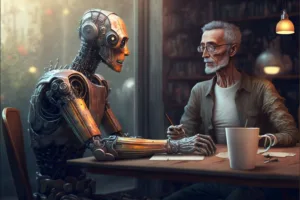
The Impact of AI in Human Careers Opportunities. Pic credit: Pinterest
The Role of Humans in an Automated World
- Creativity and Judgment:
- AI excels at data processing, but human creativity, context, and ethical judgment remain irreplaceable.
- Critical thinking, problem-solving, and emotional intelligence define our unique contribution.
- Adaptability and Lifelong Learning:
- Lifelong learning becomes essential.
- Humans must adapt to evolving technologies and embrace continuous upskilling.
- Resilience and agility are key traits.
- Ethical Decision-Making:
- AI lacks consciousness and cannot make value-based judgments.
- Humans must navigate ethical dilemmas, ensuring responsible use of technology.
Conclusion:The Impact of AI in Human Careers Opportunities
As we stand at the intersection of human potential and technological advancement, the impact of AI on career opportunities is both profound and multifaceted. Here are the key takeaways:
- Job Displacement and Transformation:
- AI automates routine tasks, leading to the displacement of certain jobs.
- However, it also transforms existing roles, creating new opportunities.
- Adaptability is crucial for individuals to thrive in this dynamic environment.
- Upskilling and Lifelong Learning:
- Upskilling is not a luxury; it’s a necessity.
- Learning new skills and staying abreast of technological changes are essential.
- Organizations and educational institutions must prioritize continuous learning.
- Human Skills Remain Vital:
- While AI excels at data processing, human judgment, creativity, and emotional intelligence remain irreplaceable.
- Critical thinking, ethical decision-making, and effective communication define our unique contribution.
- Collaboration, Not Competition:
- Rather than fearing AI as a competitor, embrace it as a collaborator.
- Human-AI partnerships yield better outcomes.
- Hybrid roles that combine technical expertise with human intuition will flourish.
- Ethical Considerations:
- As AI becomes pervasive, ethical frameworks are essential.
- Humans must ensure responsible AI deployment, addressing biases and societal impact.
FAQs: (The impact of AI in human careers opportunities)
- Will AI affect employment opportunities?
- The automation of certain tasks through AI could lead to concerns about job displacement for people currently working in different sectors.
- However, AI also creates new employment opportunities. Workers with strong digital skills may adapt to and use AI effectively, reaping its benefits.
- How will AI affect jobs and the economy?
- McKinsey estimates that AI has the potential to deliver additional global economic activity of around $13 trillion by 2030.
- Automation will substitute labor, leading to increased innovation in products and services.
- Forbes considers AI one of the most disruptive technologies across global economies.
- Is AI a positive force for society?
- AI has the potential to bring positive changes, including enhanced productivity, improved healthcare, and increased access to education.
- While some view it as disruptive, others believe it will create new vocations and solve complex problems.
- Overall, the leaning is toward AI being a positive force.
- How does generative AI impact jobs?
- Generative AI can significantly boost productivity and contribute trillions of dollars to the global economy.
- It creates new opportunities and transforms existing roles.
- Rather than fearing it, we should adapt and embrace the possibilities
- How can I prepare for an AI-driven future?
- Upskilling: Continuously learn and acquire new skills. Focus on digital literacy, data analysis, and understanding AI concepts.
- Adaptability: Embrace change and be open to learning. The ability to adapt quickly is crucial.
- Ethical Awareness: Understand the ethical implications of AI and advocate for responsible use.
- Collaboration: Work alongside AI systems, leveraging their capabilities while contributing uniquely human skills.
- Which industries will be most affected by AI?
- Manufacturing: Automation and robotics will impact assembly lines and production.
- Healthcare: AI aids in diagnostics, drug discovery, and personalized medicine.
- Finance: Algorithms handle risk assessment, fraud detection, and trading.
- Retail: AI enhances customer experience and supply chain management.
- Education: Personalized learning platforms leverage AI.
- What soft skills are essential in an AI-dominated world?
- Critical Thinking: Evaluate AI-generated insights and make informed decisions.
- Communication: Explain complex AI concepts to non-technical audiences.
- Creativity: Innovate and find novel solutions.
- Ethical Judgment: Navigate AI’s impact on society responsibly.
- Will AI replace all jobs?
- No. While some routine tasks may be automated, AI also creates new roles.
- Human judgment, creativity, and emotional intelligence remain invaluable.
- The focus should be on augmentation and collaboration, not replacement.
- How can I stay relevant in my career amid AI advancements?
-
- Lifelong Learning: Continuously upskill and stay informed about AI trends.
- Networking: Connect with professionals in your field and learn from their experiences.
- Experimentation: Explore AI tools and apply them to your work.
- Resilience: Adapt to changes and embrace uncertainty.
Also visit: https://taazakhobor.in/
More you can read:
https://deepblogs.net/diabetes-a-global-epidemic-in-the-21st-century/
Practical Education vs Theoretical Education
Hair transplant procedure in 2024. Does hair transplant work??
The Science of Laughter: How Humor Impacts Our Mental and Physical Health
